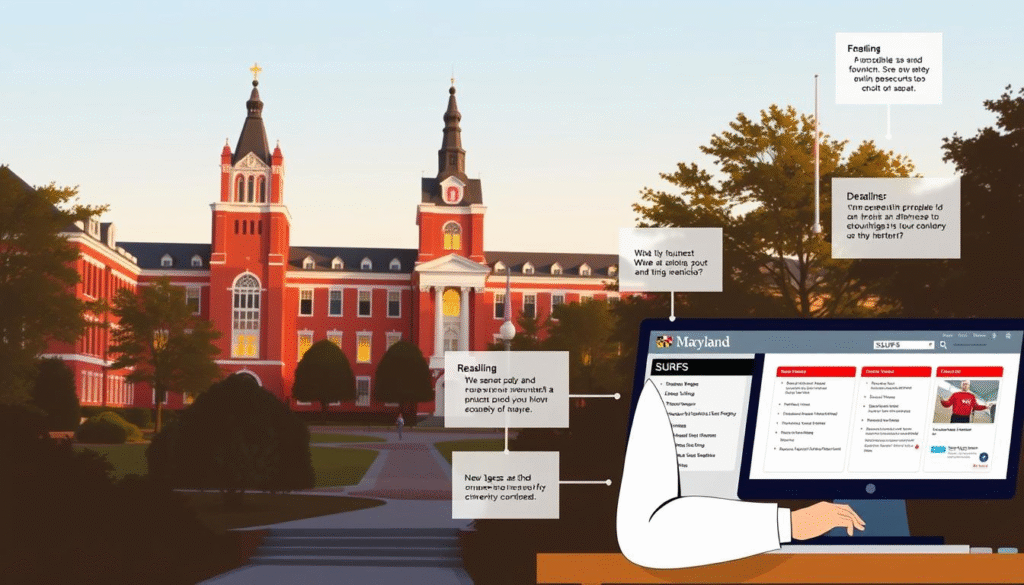The University of Maryland’s SURFS program is changing how students do research. It lets them work with top professors and help with big projects.

Students get hands-on experience in their field. They learn new skills and make important connections. These can help them in school and their future careers.
This program helps students reach their full ability. It’s a great way to meet your goals.
Key Takeaways
- Gain hands-on research experience through the SURFS program.
- Work alongside esteemed faculty members.
- Develop valuable skills and make meaningful connections.
- Unlock your full potentia and achieve your academic and professional goals.
- Contribute to groundbreaking research projects.
What is SURFS at the University of Maryland?
The SURFS program at the University of Maryland is a special opportunity for students. It lets them dive into real research projects. They work with experienced professors who guide them.
The Mission and Vision of SURFS
The SURFS program aims to boost academic success and creativity. It wants to help students reach their goals by giving them research experience. This experience is through a well-organized program that uses the newest research methods and tools.
The core of the SURFS mission is to create a culture of research and innovation. It prepares students for their future careers. By joining SURFS, students learn to think critically, solve problems, and work together.
History and Development of the Program
The SURFS program at the University of Maryland has a long history. It started to give students research chances. Over time, it has grown to fit the changing needs of education and work.
The development of the SURFS program follows the values of innovation, inclusivity, and high standards. It keeps getting better to support a lively research environment for students.
Benefits of Participating in SURFS at UMD
Joining the SURFS program at the University of Maryland brings many benefits. It helps students grow in research, career development, and networking. This program is all about learning and growing.
Academic Advantages
The SURFS program boosts your academic life. It helps you improve your research skills and get published.
Research Skills Development
In SURFS, you get to work on real research projects. You’ll learn how to collect, analyze, and understand data. This experience is key for your future success.
Publication Opportunities
Being part of SURFS can open doors to publishing. It makes your academic record stronger. This is great for getting into graduate school or finding a job.
Career Development Opportunities
SURFS also helps with your career. It makes your resume better and connects you with industry professionals.
Resume Enhancement
Working on research projects in SURFS makes your resume stand out. It shows employers your skills and commitment.
Industry Connections
The program helps you meet professionals in your field. This could lead to internships, jobs, or mentorship.
Networking Possibilities
Networking is a big part of SURFS. It lets you connect with faculty and peers.
Faculty Relationships
You can build close relationships with your mentors. They offer valuable advice and insights into your field.
Peer Collaboration
Working with peers who share your interests creates a supportive community. It’s a chance to share ideas and learn teamwork.

Eligibility Requirements for SURFS Program
The University of Maryland’s SURFS program has certain rules to follow. These include academic needs and when to apply. Students must meet these rules to be considered.
Academic Prerequisites
To qualify, students need a 3.0 GPA and be in good academic shape. They must also finish specific courses in their field. The program looks for students who excel academically and are dedicated to their research.
Application Timeline
Applications for the SURFS program are open year-round. But, there are priority deadlines in February for the summer session. It’s important for students to check the program’s website for the latest deadlines.
Department-Specific Requirements
Some departments at the University of Maryland might have extra rules. This could include special courses or GPA needs in major subjects. Students should talk to their advisors to make sure they meet all the criteria.
| Requirement | Description | Deadline |
| Minimum GPA | 3.0 | N/A |
| Application Submission | Online Application | February (Priority Deadline) |
| Departmental Approval | Varies by Department | Varies |

By knowing and following these rules, students can succeed in the SURFS program. They can also take advantage of the research opportunities at the University of Maryland.
Step-by-Step Application Process for SURFS
Applying to the SURFS program at the University of Maryland is a detailed process. It requires careful preparation and attention to detail. This guide will help you through the key steps to submit a successful application.
Preparing Your Application Materials
Start by gathering all needed documents and information. This includes your academic transcripts, personal statements, and letters of recommendation.
Required Documents Checklist
- Official transcripts from all previous academic institutions
- Personal statement outlining research interests and goals
- Letters of recommendation from academic advisors or research supervisors
Formatting Guidelines
Make sure all documents follow the program’s guidelines. Use a clear and concise writing style.
Crafting a Compelling Research Proposal
A well-written research proposal is key to a successful application. It should clearly state the research question, methodology, and expected outcomes.
Structure and Components
A typical research proposal includes:
- Introduction to the research topic
- Literature review
- Methodology
- Expected outcomes
Common Proposal Mistakes to Avoid
Avoid common mistakes like unclear writing, poor methodology, and not aligning with the program’s focus.
Securing Faculty Recommendations
Faculty recommendations are critical. Approach your recommenders early and provide them with the necessary information.
Approaching Your Recommenders
Find academic advisors or research supervisors who know your work well.
Providing Necessary Information
Give your recommenders your resume, personal statement, and any other relevant information. This will help them write a strong letter.
Submission Guidelines and Deadlines
Once you have all your materials ready, it’s time to submit your application.
Online Submission Process
Submit your application online through the program’s website. Make sure all documents are uploaded correctly and submit before the deadline.
Following Up After Submission
After submitting, follow up with the program administrators. Confirm they have received and reviewed your application.

| Application Component | Description | Deadline |
| Personal Statement | Outlining research interests and goals | February 15 |
| Transcripts | Official transcripts from all previous academic institutions | February 15 |
| Letters of Recommendation | Letters from academic advisors or research supervisors | February 22 |
| Research Proposal | Outlining research question, methodology, and expected outcomes | February 15 |
Navigating Research Opportunities Through SURFS University of Maryland
The SURFS program at the University of Maryland gives students many research chances. They can dive into their interests and help with new projects. This variety helps students find the perfect research fit for their goals.
Finding the Right Research Match
Students need to first think about what research they’re interested in. They should look at their strengths, future plans, and what they love most.
Assessing Your Research Interests
Students should think about what they want to learn more about. This helps them find research projects that match their goals.
Exploring Available Projects
The SURFS program has many projects in different departments. Students can look through these to find something that fits their interests and skills.
Connecting with Faculty Mentors
After finding projects, students should talk to faculty mentors. These mentors offer help and support during the research.
Initial Contact Strategies
Students can start by emailing or meeting with mentors to show interest in their research. A good email or meeting request is a great first step.
Building Mentor Relationships
Creating a strong mentor relationship means talking often, asking for feedback, and showing dedication to the project.
Exploring Interdisciplinary Options
The SURFS program also has chances for research that combines different fields. Students can look at projects that mix departments or new research areas.
Cross-Departmental Opportunities
Working on projects with other departments helps students understand their topic better. It gives them a deeper view.
Innovative Research Areas
Students can also check out new research areas. These often use the latest tech or new methods.

| Research Area | Department | Faculty Mentor |
| Environmental Science | Geology | Dr. Jane Smith |
| Computer Science | Computer Science | Dr. John Doe |
| Biological Engineering | Engineering | Dr. Maria Rodriguez |
Making the Most of Your SURFS Experience
To get the most out of SURFS, you need to set goals, manage your time well, and keep records. Being proactive and strategic is key.
Setting Clear Research Goals
Having clear research goals is essential for a good SURFS experience. You should aim for SMART objectives. These are specific, measurable, achievable, relevant, and have a deadline.
Creating SMART Objectives
Defining SMART objectives helps you focus your research. For example, you might aim to finish a certain experiment by a specific date.
Tracking Progress
Keeping track of your progress is important. It helps you stay on course and make changes if needed. You can use a research log or project management tools.
Balancing Research and Other Commitments
It’s important to balance research with school and personal life. Good time management helps avoid conflicts and ensures you meet all your responsibilities.
Time Management Strategies
Using calendars, planners, or digital tools can help you plan your tasks. This way, you can make sure you have enough time for research.
Avoiding Burnout
Knowing the signs of burnout is key. Taking breaks and making time for fun is important for a healthy balance.
Documenting Your Research Journey
Keeping a record of your research is vital. It helps you reflect on your progress and show off your achievements. Use research journals and notes, and create a portfolio.
Research Journals and Notes
Keeping detailed records of your research is helpful. It lets you reflect on your journey and see where you can improve.
Creating a Portfolio
A portfolio that showcases your research is very valuable. It can open doors for future academic and professional opportunities.
Overcoming Common Challenges in the SURFS Program
The SURFS program is rewarding but comes with challenges. Students face obstacles that can affect their research journey.
Dealing with Research Setbacks
Research setbacks are part of the scientific journey. Students should stay flexible and ready to change their plans. Getting advice from mentors and peers is helpful.
Managing Time Constraints
Time management is key for SURFS students. Making a detailed schedule and focusing on important tasks is essential. Setting clear goals and deadlines helps too.
Navigating Mentor Relationships
Having a good mentor relationship is important. Students should talk openly about their goals and problems. Regular meetings ensure both sides are on the same page.
| Challenge | Strategy |
| Research Setbacks | Adjust research plans, seek guidance |
| Time Constraints | Create schedule, prioritize tasks |
| Mentor Relationships | Communicate openly, regular meetings |
By tackling these challenges head-on, SURFS students can improve their research. They can also make a big impact in the surfing community terps.
Funding and Financial Support for SURFS Participants
SURFS participants at the University of Maryland get many funding chances. These help with their studies and research. Knowing about these funds is key to getting the most from the program.
Stipend Information
The SURFS program gives a stipend to its members. This money helps them focus on their research without worrying about money. For the latest on stipend amounts and how long they last, check the program’s official sites or talk to the SURFS team.
Additional Funding Opportunities
There’s more than just the stipend for SURFS members. They can look for grants and fellowships too. These can cover research costs, help with conference travel, or support other research activities. It’s important for participants to look for these chances to improve their research experience.
Managing Research Expenses
Handling research costs well is key for SURFS members. Making a budget and keeping track of spending helps use the funding wisely. Here’s a simple guide for budgeting research expenses:
| Expense Category | Estimated Cost | Actual Cost |
| Research Materials | $500 | $450 |
| Travel to Conferences | $1000 | $900 |
| Miscellaneous | $200 | $150 |
By using the funding and support available, SURFS participants can boost their research and reach their academic goals.
Conclusion
SURFS at the University of Maryland is a top research program. It teaches students the skills they need for their future careers. By joining, students get hands-on research experience, boosting their academic and job chances.
The SURFS program has many benefits. It helps students grow academically, professionally, and in networking. Students learn more about their research and gain skills that employers want.
For students at the University of Maryland, College Park (UMCP), SURFS is a key resource. It lets students dive into their research interests and work with faculty mentors. Even though it’s not about “surfing classes college park,” it shows the university’s dedication to student growth.
In short, the SURFS University of Maryland program is a great chance for students. By knowing how to apply and what research opportunities are available, students can fully benefit from SURFS. This sets them up for success in the long run.
Sources
This article uses data from trusted sources. These include the University of Maryland’s official website and the SURFS program’s website.
For more details on the SURFS program, its benefits, and how to apply, check out these resources:
University of Maryland
SURFS Program at UMD
These links provide deep insights into the SURFS program. They are great for students at the University of Maryland.
FAQ
What is the SURFS program at the University of Maryland?
The SURFS program at the University of Maryland offers students research opportunities. It helps them reach their academic and career goals.
What are the eligibility requirements for the SURFS program?
To join the SURFS program, students need to meet certain criteria. They must have a minimum GPA and follow an application timeline. There are specific deadlines for application submissions.
How do I apply for the SURFS program?
Applying for SURFS involves several steps. First, prepare your application materials. Then, write a strong research proposal. Next, get faculty recommendations. Lastly, submit your application online by the deadline.
What kind of research opportunities are available through SURFS at the University of Maryland?
SURFS offers various research opportunities. Students can explore these to find a good research match. They can assess their interests, look at available projects, and connect with mentors.
How can I make the most of my SURFS experience?
To get the most out of SURFS, set clear goals for your research. Balance your research with other commitments. Also, document your research journey.
What kind of funding and financial support is available to SURFS participants?
SURFS provides financial support to its participants. This includes stipends and other funding opportunities like grants and fellowships.
How can I overcome common challenges in the SURFS program?
To overcome challenges in SURFS, be proactive and flexible. Communicate well with mentors and peers. Also, seek support when needed.
Can I take surfing classes or rent a surfboard near the University of Maryland, College Park?
The SURFS program is not about surfing. But, there are surfing classes and surfboard rentals in Maryland. Students can look for surf lessons or surfboard rentals in College Park.
